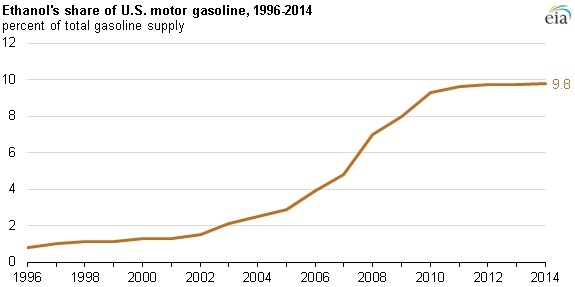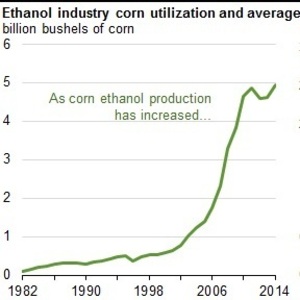EIA: Corn ethanol yields continue to improve



U.S. Energy Information Administration, Monthly Energy Review
May 13, 2015
BY U.S. Energy Information Administration
In 2014, U.S. fuel ethanol production reached 14.3 billion gallons of ethanol fuel, the highest level ever. The growth in U.S. fuel ethanol production has outpaced growth in corn consumed as feedstock—as the industry has grown, it has become more efficient, using fewer bushels of corn to produce a gallon of ethanol.
If ethanol plant yields per bushel of corn in 2014 had remained at 1997 levels (when ethanol made up just 1 percent of the total U.S. motor gasoline supply), the ethanol industry would have needed to grind an additional 343 million bushels, or 7 percent more corn, to produce the same volume of fuel. To supply this incremental quantity of corn without withdrawing bushels from other uses would have required 2.2 million additional acres of corn to be cultivated, an area roughly equivalent to half the land area of New Jersey.
Several factors contributed to the yield increases from a bushel of corn. Increased scale has allowed producers to incorporate better process technology, such as finer grinding of corn to increase starch conversion and improved temperature control of fermentation to optimize yeast productivity. The growth of the corn ethanol industry also enabled the development of better enzymes and yeast strains for improved output per bushel of corn.
Advertisement
Advertisement
This growth in ethanol production has been made possible by a rise in demand for ethanol to increase octane levels as MTBE (methyl tert-butyl ether, a gasoline additive) has been phased out of gasoline, and to meet renewable fuel standard (RFS) targets enacted in 2005 and expanded by subsequent legislation in 2007. RFS requirements effectively placed a floor under ethanol demand. Recently, ethanol's volumetric share of total U.S. motor gasoline supply has been just below 10 percent, reaching 9.8 percent in 2014.
Advertisement
Advertisement
Related Stories
The U.S. EPA on July 8 hosted virtual public hearing to gather input on the agency’s recently released proposed rule to set 2026 and 2027 RFS RVOs. Members of the biofuel industry were among those to offer testimony during the event.
The USDA’s Risk Management Agency is implementing multiple changes to the Camelina pilot insurance program for the 2026 and succeeding crop years. The changes will expand coverage options and provide greater flexibility for producers.
EcoCeres Inc. has signed a multi-year agreement to supply British Airways with sustainable aviation fuel (SAF). The fuel will be produced from 100% waste-based biomass feedstock, such as used cooking oil (UCO).
President Trump on July 4 signed the “One Big Beautiful Bill Act.” The legislation extends and updates the 45Z credit and revives a tax credit benefiting small biodiesel producers but repeals several other bioenergy-related tax incentives.
CARB on June 27 announced amendments to the state’s LCFS regulations will take effect beginning on July 1. The amended regulations were approved by the agency in November 2024, but implementation was delayed due to regulatory clarity issues.
Upcoming Events










